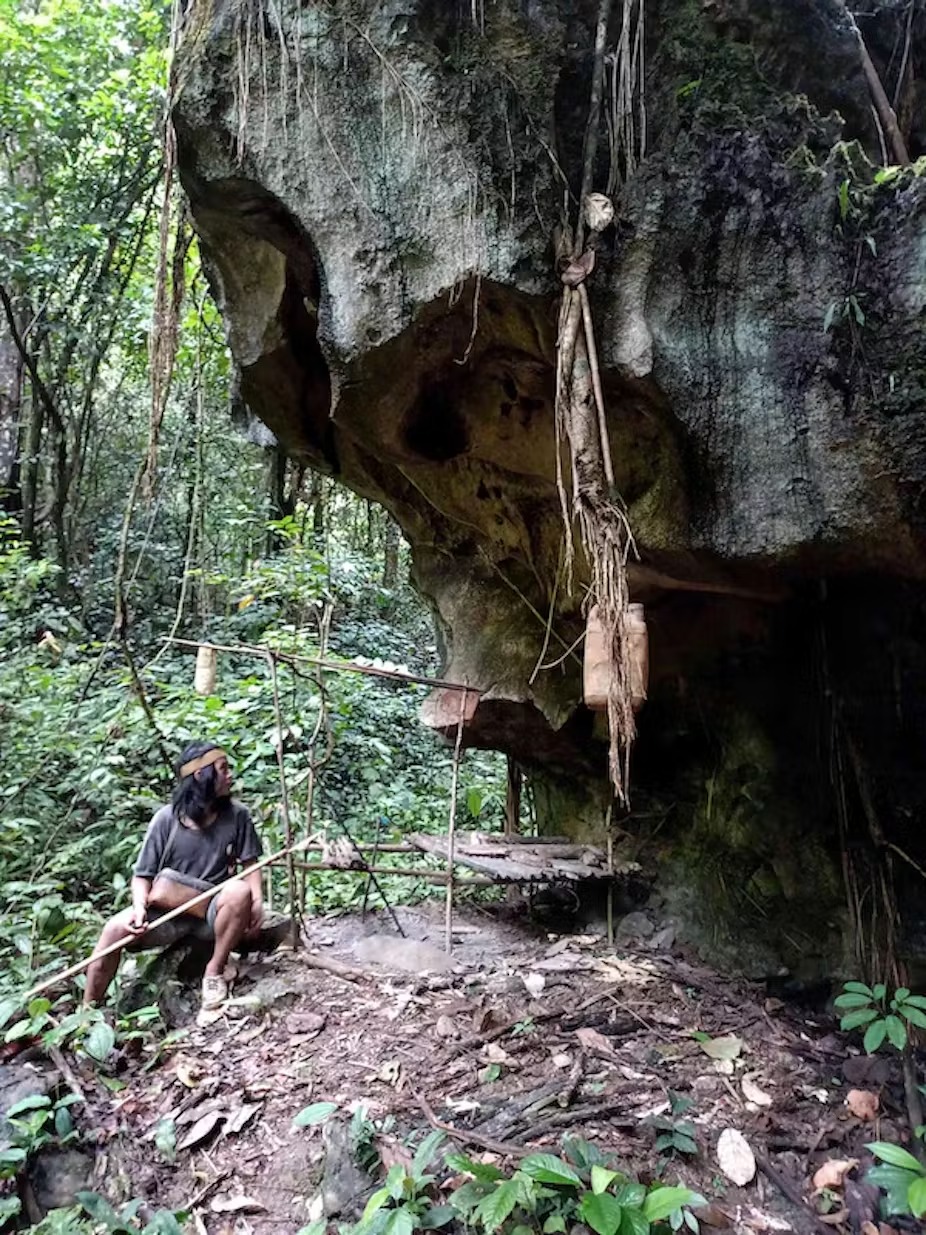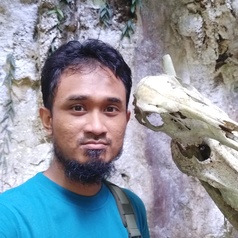Borneo is one of the world’s most biodiversity-rich regions, home to ancient rainforests and an immense variety of wildlife.
Among its inhabitants are the Punan Batu, a group of contemporary nomadic hunter-gatherers with a unique genetic makeup and lifestyle that reflect the deep ancestry of the region. The Punan Batu people live in the forest surrounding Mount Batu Benau in Bulungan Regency, North Kalimantan Province.
Our recent study, published in the journal Cell Reports, sheds light on their genetic history and cultural heritage, offering a rare glimpse into a way of life that was once widespread in the forests of Borneo.
Our research
We began our research with a community engagement program to get informed consent and support for our project from the Punan Batu community.
We then worked with phlebotomists, medical professionals trained to perform blood draws and health personnel from the local health centre to collect 30 blood samples from the community.
We also provided free health and blood biochemistry checks using point-of-care tests. We returned the results to the participants and the local health centre for any necessary follow-ups.
Genetics trait
The Punan Batu are part of a larger group of Punan/Penan, the forest hunter-gatherer group, who was believed to have shifted mainly into a sedentary lifestyle. Living in harmony with nature, the Punan Batu still follows a nomadic lifestyle.
They travel in family groups, moving between network of rock shelters and forest camps. They rely on the forest for their food, medicine and materials.
Our genetic analysis revealed that the Punan subgroups in our study are closely related, albeit in distant locations from neighbouring indigenous groups which rely on farming. So, Punan is not only a cultural identity but also a genetic identity.
Interestingly, unlike most people living in the archipelago of Southeast Asia comprising Indonesia and the Philippines, there is no gene flow from Austronesian-related ancestry to Punan Batu.
Austronesians are a linguistic and cultural group that originated in Taiwan and spread across the Pacific and Indian Oceans, bringing with them farming, seafaring and pottery skills.
The lack of Austronesian-related ancestry in Punan Batu indicates that they have remained isolated from the significant waves of migration and cultural diffusion that have shaped the region.
This finding challenges the idea that they are the descendants of farmers who reverted to a hunting and gathering way of life. Instead, it suggests that they have preserved their genetic integrity over a long period, resisting the influence of other groups and retaining their unique genetic heritage.
Language and lifestyle
The Punan Batu are unique not just in their genetic makeup but also in their language and lifestyle.
As described in our 2022 research, they preserve a song language, the Latala language, that is unrelated to other languages of Borneo, even to any other languages in Southeast Asia.
The Punan Batu people use Latala as a particular language for artistic expression, similar to how some poets use ancient languages such as Homeric Greek, Latin or Old Javanese. Latala is currently only used for poetry. This shows ancient cultural inheritance, further evidence of their distinct demographic history.
This language, passed down through generations, is a significant part of their cultural identity. It contains rich oral traditions, such as myths, legends and songs, which reflect their worldview and values.
They also use message sticks to stay in contact, cooperate and share resources. Message sticks are wooden sticks with symbols on top of the stick that convey information, such as the location, direction and purpose of travel.
It also serves as a mechanism to avoid diseases when indicating the direction of family members who are ill as a self-quarantine measure.
This method of communication was once widespread among nomadic Punan in Borneo, including the Penan in Sarawak, Malaysia, but has largely disappeared in sedentary Punan villages.
Challenges and threats
The provincial government, assisted by an Indonesian NGO, proposed the area of Mount Batu Benau in Bulungan Regency, North Kalimantan Province, where The Punan Batu lives, as a geopark site, an area that consists of several geological heritage sites with precious geological, biological and cultural values.
The forest’s biodiversity provides food and water for the Punan people.
However, the Punan Batu’s way of life is currently under threat. Their forest home is shrinking due to the expansion of logging and palm oil companies.
Our research finds that this affects their traditional hunting and gathering activities and threatens their cultural heritage.
Despite these challenges, the Punan Batu continue to hold on to their unique way of life. They have a strong sense of identity and pride in their culture.
This year, the local government has recognised them as the customary law community, a group whose members still live in a traditional community and clear traditional boundaries.
This group has a prevailing system of laws that is followed by its members. The people still utilise forest areas to meet daily needs, to formally acknowledge their existence as an ethnic group in the region. It is an essential first step towards supporting their way of life.
But they need more robust protection in the future, such as Customary Forest status, a forest that is not burdened with land rights. Under this status, the management of the forest is delegated to Indigenous People to avoid further environmental and forest degradation and social conflicts.
The Punan Batu’s story reminds them of Borneo’s rich cultural diversity and deep ancestry. As we continue to learn more about them, preserving their cultural heritage and forest as their home is crucial. They are a living link to the past and a valuable source of knowledge and wisdom for the future.



 Lake beds are rich environmental records — studying them reveals much about a place’s history
Lake beds are rich environmental records — studying them reveals much about a place’s history  How is Antarctica melting, exactly? Crucial details are beginning to come into focus
How is Antarctica melting, exactly? Crucial details are beginning to come into focus  Drug pollution in water is making salmon take more risks – new research
Drug pollution in water is making salmon take more risks – new research  GesiaPlatform Launches Carbon-Neutral Lifestyle App ‘Net Zero Heroes’
GesiaPlatform Launches Carbon-Neutral Lifestyle App ‘Net Zero Heroes’  We combed through old botanical surveys to track how plants on Australia’s islands are changing
We combed through old botanical surveys to track how plants on Australia’s islands are changing  What’s so special about Ukraine’s minerals? A geologist explains
What’s so special about Ukraine’s minerals? A geologist explains  The UK is surprisingly short of water – but more reservoirs aren’t the answer
The UK is surprisingly short of water – but more reservoirs aren’t the answer  Burkina Faso and Mali’s fabulous flora: new plant life record released
Burkina Faso and Mali’s fabulous flora: new plant life record released  Thousands of satellites are due to burn up in the atmosphere every year – damaging the ozone layer and changing the climate
Thousands of satellites are due to burn up in the atmosphere every year – damaging the ozone layer and changing the climate  Parasites are ecological dark matter – and they need protecting
Parasites are ecological dark matter – and they need protecting  Swimming in the sweet spot: how marine animals save energy on long journeys
Swimming in the sweet spot: how marine animals save energy on long journeys  How ongoing deforestation is rooted in colonialism and its management practices
How ongoing deforestation is rooted in colonialism and its management practices  Fertile land for growing vegetables is at risk — but a scientific discovery could turn the tide
Fertile land for growing vegetables is at risk — but a scientific discovery could turn the tide 
































